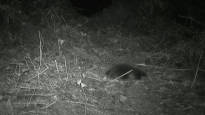Named after the famous nature documentarian, Zaglossus attenboroughi was spotted on the last day of the month-long expedition. Until now, there has been little evidence of the species’ existence.
An international team of researchers managed to record a rare beaked hedgehog on video: the Zaglossus attenboroughi species was thought to be extinct. Among other things, the news covered the matter BBC.
The researchers were able to capture four video clips lasting a few seconds of the porcupine during a month-long research trip in the mountains of New Guinea in Indonesia in June.
Interviewed by the BBC, the head of the research team, Dr James Kempton describes the research team as being in a “euphoric state” when the beaked hedgehog was spotted in the camera images.
– We recovered the image on the last memory card of the camera, from the last camera we recovered, on the last day of the research trip, Kempton says.
Zaglossus attenboroughi is named after a British nature documentaryi by David Attenborough by. It is one of the four known species of hedgehogs.
Until now, the only evidence of its existence has been a specimen found in the same area in Indonesia in 1961. The origin of the species is suspected to date back about 200 million years to the time of the dinosaurs.
In addition to the beaked hedgehog, the research team discovered completely new species of insects and frogs and made observations of healthy populations of tree kangaroos and birds of paradise. In particular, tree kangaroos are defined on the pages of the International Union for Conservation of Nature (IUCN) as endangered (VU) or critically endangered (EN).
Kempton hopes that evidence of the existence of the porcupine and the new species will promote the mountain’s status as a conservation area. The beaked hedgehog in question does not belong to the currently protected species in Indonesia. There is no information on the size of the population.
